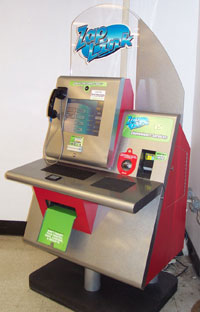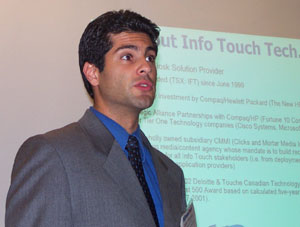Article
Retail is the word at Phoenix show
Innovation and optimism are on display at the Interactive Self-Service Retail show.
October 17, 2002
PHOENIX -- The hottest applications for self-service kiosks are in the retail sector, and the time to get in the game is now.
That was part of the message of the third-annual Interactive Self-Service in Retail show, being held at the Hyatt Regency Phoenix Oct. 16-18. About 40 attendees came to the desert Southwest for the three-day show, many of them in the process of developing a kiosk strategy for their operations.
The retail optimism for kiosks may have been best expressed by Francie Mendelsohn, president of Summit Research, who said most major retailers are either exploring or implementing a kiosk program. Her presentation, "Retail Kiosks: A Users Appraisal -- What Succeeds, What Fails and Why?" was filled with plenty of examples of great projects and, of course, a typically blunt assessment of a few she didn't go for.
Here are a few highlights from the show's first full day:
The Zaplink 500: If you're in Phoenix talking kiosks, it must be about Zaplink, the multi-function kiosk project from Info Touch Technologies and ConocoPhillips, owner of Circle K convenience stores. Info Touch chairman and CEO Hamed Shahbazi proclaimed the 35-store test in Phoenix Circle Ks, launched earlier this year, a success and announced plans to install it in 500 stores by the second quarter of 2003.
Along with Scott Templeton, innovation group manager for Circle K, Shahbazi explained the "monetization model" for the kiosks that has worked so well in Phoenix. It combines pay-per-use services, transactional applications and advertising revenue. The killer app in Phoenix, they said, was the bill payment application for wireless phone time.
"This is the big dog, the dog that's gonna hunt," said Templeton, who added that the Zaplink program has been paying for itself for six months.
Templeton said one of the keys to making the program successful was keeping the price of the machines at a low level while offering a variety of services. He said he'd talked with several other vendors, but none could deliver the package Info Touch provided.
 |
According to Info Touch Technologies, the company's Zaplink 500 kiosk has performed well in a 35-store test with ConocoPhillips. |
Shahbazi said the new kiosks, currently undergoing a redesign, will be launched first in southwestern markets such as Tucson and Albuquerque. He said the deployments will be backed by a group of individual investors.
A Novel Concept. Bob Edington, director of interactive media for Borders Stores, brought news of a significant expansion of Borders' Title Sleuth kiosk program installed in nearly 400 bookstores. Borders has entered into a partnership with Alibris, a company specializing in used and out-of-print books.
"We made 15 million more books available through Title Sleuth," Edington said of the new deal, completed Oct. 16. Customers will search for and order books on the kiosks, and then purchase them upon delivery to the store.
He said the kiosks, heading into their third Christmas season, handle more than 1.3 million searches per week. That number, he added, is growing and is likely to double during the Christmas shopping rush.
Rating with ROI. Doug Peter, who's spent 22 years in interactive self-service and is president of St. Clair Interactive Communications, opened his presentation on ROI like a grizzled and cynical veteran. "I've seen 2,000 projects come and go. I've seen eight survive."
In truth, Peter's pitch was far from cynical, and he's been involved in more than 400 self-service projects, many of which are still running and successful.
Peter claimed that, by his calculations, a kiosk must generate at least $1.36 per hour in revenue gained and/or operational costs saved to produce a real return on investment.
The key problem with a lot of failed projects, Peter said, is that they're not designed correctly. "They're designed for failure right out of the gate. They're structured so they can never make any money."
St. Clair, the lone sponsor of the gathering, demonstrated a number of intriguing projects in the works, including one in which a grocery positions customer service kiosks throughout the store.
Earlier, Peter's rationale for optimism in self-service applications made as much sense as anything said all day.
"Self-service will grow because of labor costs," he said. "A lot of people don't want to talk to anybody. They want to get it themselves."
Virtual speaker. Chris Reed, vice president of marketing for Unicru, was unable to appear at the show in person to talk about his company's human resources kiosks. He made his presentation, therefore, via the magic of teleconferencing.
Reed's Oregon-based company specializes in retail human resources applications, and currently operates 13,000 kiosks for clients such as groceries, department stores and restaurants.
Reed provided some eye-opening statistics about Unicru's kiosks for G.I. Joe's, a regional chain of stores selling outdoor gear. Using a low-end, $1,000 kiosk placed at the front of the stores, G.I. Joe's reduced turnover among employees from 168 percent to 70 percent in two years. The kiosks also reduced the time it took to hire staff members and, surprisingly, helped reduced theft.
Uncle Sam wants kiosks. Kiosk practitioners sometimes overlook government projects, perhaps due to the bureaucracy and red tape involved in getting the work. But the audience at the show included representatives from the U.S. Postal Service, Department of Defense and the U.S. Senate.
 |
Info Touch Technologies' CEO Hamed Shahbazi spoke to attendees of the third-annual Self-Service In Retail show. |
Ernie LePire, director of the Senate Gift Shop, said he was there to gain knowledge for his planning of a kiosk deployment at a new 2,100-square-foot Capitol Visitors Center expected to open in 2005. LePire said the Senate Gift Shop sells everything from cuff links to coffee mugs to crystal, and is used by senators, their spouses, constituents and tourists.
Do it again: Lawrence Dvorchik, executive director of the event, said it's too early to determine if the event will take place again in 2003. He said that while attendance is down from last year's event, held in San Diego, he thinks the show is valuable to attendees and the industry.
"People who are just curious aren't jumping to come," he said. "People who are serious and looking at kiosks as a strategy seem to be coming more. Kiosks are going to happen; the question is when. And people are learning they have to be successful the first time out."
Meanwhile, he and event chairman Bob Fincher, executive vice president of NetWorld Alliance, spent time planning the KioskCom 2003 event, next April 7-10 in Las Vegas. Dvorchik said he expects that show to be bigger and better than any of the other kiosk events he's staged.
[Editor's note: Info Touch Technologies became Tio Networks in April 2006.]










